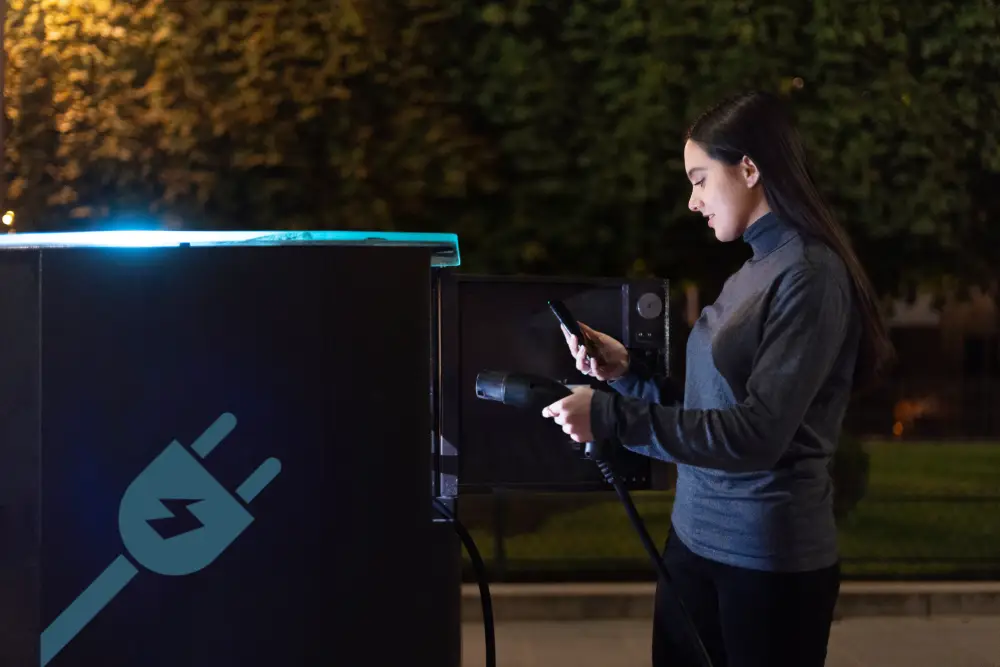As electric vehicles (EVs) become increasingly popular, having a home charging station is essential for convenience and efficiency. If you live in Denver and are considering installing an EV charging station, it’s important to understand your options to choose the best one for your needs. This guide will help you navigate the process of selecting the right EV charger for your home while also considering installation requirements and local factors.

Understanding EV Charger Types
There are three main types of EV chargers, categorized by their charging speed and power output:
Level 1 Chargers
- Use a standard 120-volt household outlet.
- Charge rate: 3-5 miles of range per hour.
- Best for overnight charging or low-mileage drivers.
- No special installation required, but slow charging speed.
Level 2 Chargers
- Operate on a 240-volt outlet, similar to large home appliances.
- Charge rate: 12-60 miles of range per hour.
- Faster and more efficient than Level 1 chargers.
- Requires professional installation.
Level 3 (DC Fast Chargers)
- Typically used for commercial or public charging stations.
- Charge rate: 60-250 miles of range in 30 minutes.
- Not typically installed in residential homes due to high power requirements.
For most Denver homeowners, a Level 2 charger is the ideal option as it offers a good balance of speed and affordability.
Factors to Consider When Choosing an EV Charger
1. Power Output and Charging Speed
Consider the battery size of your EV and how quickly you need it charged. A 32-amp or 40-amp Level 2 charger is a common choice for homeowners.
2. Compatibility with Your EV
Ensure the charger you choose is compatible with your EV model. Some chargers come with universal connectors, while others are brand-specific.
3. Smart Features and Connectivity
Many modern EV chargers offer smart features such as:
- Wi-Fi or Bluetooth connectivity.
- Mobile app integration for remote monitoring.
- Scheduling options to charge during off-peak hours to save on electricity costs.
4. Installation Requirements
- Level 2 chargers require a dedicated 240V outlet, which may need to be installed by a professional electrician.
- Consider the placement of the charger for convenience and accessibility.
- Verify if permits are needed for EV charger installation in Denver.
5. Cost and Incentives
- Home EV chargers typically cost between $500 and $2,000, depending on features and power output.
- Installation costs vary but can range from $500 to $1,500.
- Check for available tax credits, rebates, or incentives from Denver and Colorado state programs.
Denver EV Charger Installation: What You Need to Know
If you’re installing an EV charger in your Denver home, here are a few important factors to consider:
Finding a Qualified Installer
- Look for certified electricians with experience in EV charger installations.
- Ensure they are familiar with Denver’s electrical codes and permit requirements.
- Get multiple quotes to compare pricing and services.
Local Regulations and Permits
- The City of Denver may require permits for electrical work related to EV charger installation.
- Homeowners’ associations (HOAs) may have rules regarding external modifications.
- Some utility companies offer incentives for installing energy-efficient chargers.
Weather Considerations
- Denver’s winters can be harsh, so consider weatherproofing your charger installation.
- Choose a unit with a high durability rating and protection against snow, rain, and temperature fluctuations.
Choosing the Best Location for Your EV Charging Station
- Install the charger close to where you park your EV to minimize cord length and maximize convenience.
- If you have a garage, wall-mounted chargers are a great space-saving option.
- For outdoor installations, make sure the charger is rated for all-weather use.
Maximizing Your EV Charging Efficiency
- Charge During Off-Peak Hours: Many utility companies in Denver offer lower rates for electricity used at night.
- Monitor Charging via Apps: Many smart chargers allow you to track and control charging sessions remotely.
- Regular Maintenance: Keep your charger clean and free of debris to ensure long-term functionality.
Conclusion
Choosing the right EV charger for your Denver home depends on your vehicle, charging needs, budget, and installation considerations. A Level 2 charger is the most practical choice for homeowners, offering a good balance between speed and cost. Make sure to hire a qualified installer and take advantage of available rebates to maximize savings. By investing in a home charging station, you’ll enjoy the convenience of powering your EV efficiently while contributing to a greener future.
Looking for Denver EV charger installation? Contact a certified installer today to get started with your home charging station!
FAQs
1. How long does it take to charge an EV at home?
It depends on the charger type. A Level 2 charger typically takes 4-8 hours to fully charge an EV, whereas a Level 1 charger may take 12-24 hours.
2. Do I need a permit for EV charger installation in Denver?
Yes, most residential Level 2 charger installations require a permit. Check with your local municipality for specific regulations.
3. Can I install an EV charger myself?
While Level 1 chargers require no special installation, Level 2 chargers typically need professional installation due to electrical requirements.
4. Are there incentives for installing a home EV charger in Denver?
Yes, Colorado offers various rebates and incentives. Check with your utility provider and state programs for potential savings.
